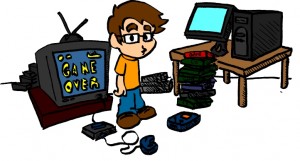 It shouldn’t be much of a surprise to parents, educators, and developmental psychologists that children learn through their video game play. After all, it is through play that children get to practice skills that they will need in later childhood and as adults, giving them opportunities to take on different roles, be creative, and solve complex problems.
It shouldn’t be much of a surprise to parents, educators, and developmental psychologists that children learn through their video game play. After all, it is through play that children get to practice skills that they will need in later childhood and as adults, giving them opportunities to take on different roles, be creative, and solve complex problems.
The best games generally use an array of cognitive skills that psychologists refer to as executive functions. For our purposes, we define executive functions as brain-based cognitive skills that facilitate critical thinking and self-regulation. They include skills such as planning, working memory, organization, time management, self-control, focus, cognitive flexibility, and self-awareness.
Watch your child or, better yet, sit down yourself in front of a simulation game such as Rollercoaster Tycoon or the Sims and see how you need to plan virtually everything you do in order to be successful in the game. Play a sports game and observe how you need to use your time-management skills by being aware of the amount of time left in the game and your flexibility skills when you need to modify your approach based upon the score and your current situation in the game.
Unfortunately, you can’t just sit your children in front of a well-designed video game and expect them to learn all the skills they need to succeed in the real world or to just improve executive functions. They are likely to learn a few skills in the game but will need a little coaching and guidance to transfer these skills to their daily lives. That doesn’t necessarily have to come from you; it could be from an older brother or sister, a peer who plays the same game, or a teacher who uses these games in the classroom setting. However, they are more likely to be able to transfer game-based skills to the real world if they are asked to think about what they are doing and to consider how it might help them in real-world activities.
On the LearningWorks for Kids website, we offer a few general strategies that will help your child to improve executive functions with digital play. These include:
1. Familiarize yourself with the games your child likes and engage in a general conversation about what your child is doing in theses game and what they need to do in order to beat the them.
2. Sit down and watch the child play their favorite games (or, better yet, try to play some of them yourself).
3. Have your child be your coach, teaching you specific techniques in game play. As the child is doing this, formulate your questions so as to ask them about the underlying skills that go into their game-based decision making.
4. When you get the chance, ask about how your child might use some of these game-based skills to help with school projects, get along with others, or get better grades.
Receive online class information and helpful tips from Dr. Randy Kulman's LearningWorks for Kids |





